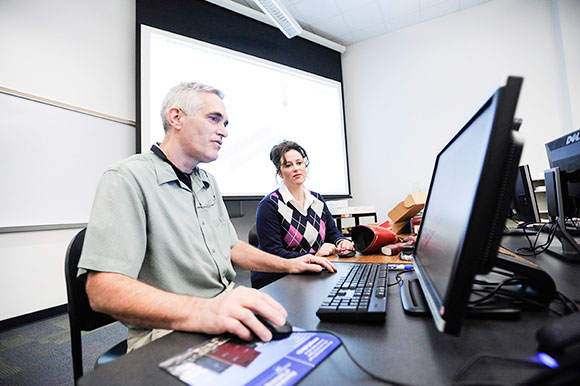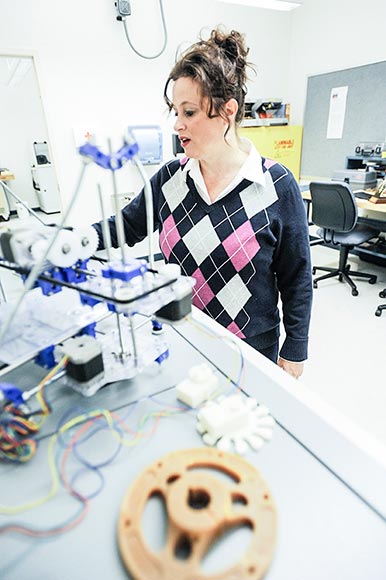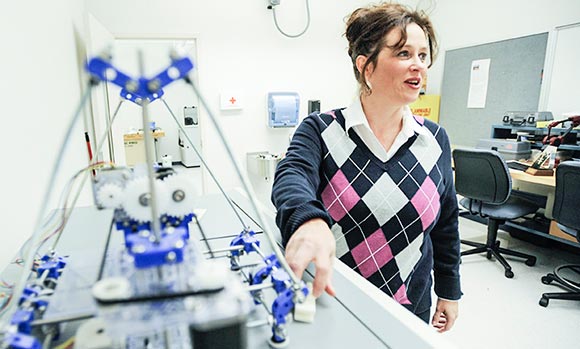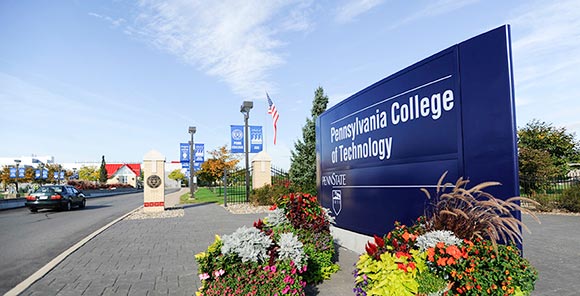In August 2012, a consortium of 65 companies, universities, community colleges, and non-profit organizations won a three-year, $45-million grant from the federal government to establish and operate the National Additive Manufacturing Innovation Institute (NAMII). The institute hopes to facilitate collaboration to improve and expand additive manufacturing, colloquially known as 3D printing.
In this process, instead of cutting away materials from a raw shape in order to produce a finished object, the object is built, layer by layer, by precisely depositing or fusing material with the help of a computer. Additive manufacturing thus saves material and energy and is increasingly important to Pennsylvania and industry. Although NAMII's headquarters are located in Youngstown, Ohio, Pennsylvania will play an outsized role in the new institute, which is expected in turn to benefit the commonwealth.
Of the 14 universities and community colleges in NAMII, half are in Pennsylvania, ranging from research universities such as Penn State and Carnegie Mellon to community colleges such as Westmoreland Community College and Northampton Community College. The community colleges in particular will play an important role in connecting innovations in additive manufacturing to their deployment in industry: these colleges have experience teaching 3D printing from when it was used on a smaller scale for prototyping and modeling and they will train future workers for expanded additive manufacturing.
Dr. Paul Pierpoint, Vice President of Community Education for Northampton Community College, explains the school got involved with NAMII in part becuase it already has a fabricating lab in South Bethlehem.
“The facility was put together to try to help inventors and people with ideas to create real physical objects,” he says. “One of the tools we got was a 3D printer; it was one of the first in the region.”
Hence, as innovations emerge from NAMII, Northampton will be among the first to disseminate them.
“From the community college’s perspective,” says Pierpoint, “we want to be sure that anyone who wants to introduce this new manufacturing technique has the workers they need to do it. If we want to maintain a manufacturing base in the Lehigh Valley, this is the way we need to go.”
At Pennsylvania College of Technology, a special-mission affiliate of Penn State in Williamsport, Vice President for Workforce and Economic Development Tracy L. Brundage tells a similar story.
“We have a credit degree program in advanced manufacturing that offers coursework in additive manufacturing (rapid prototyping), so we felt that we had a number of resources that would benefit the initiative in terms of faculty expertise, equipment, state-of-the-art labs, and curriculum.
says Brundage.
“Our faculty will gain access to a network of other subject-matter experts which can help guide future programming decisions, curriculum updates, and equipment specifications.”
Brundage also hopes Penn College will lead the way in local workforce training as demand spreads for advanced manufacturing. She expects Penn College's role to be defined further when NAMII members meet for the first time October 10.
In addition to benefiting from trained workers, Pennsylvania companies expect to benefit from NAMII in other ways while also helping it. For instance, Allegheny Technologies, Inc. in Pittsburgh sells several billion dollars annually in specialty metals, primarily for aerospace and defense, both key markets for additive manufacturing. The company's CEO and chairman Richard Harshman was on the Advanced Manufacturing Partnership Steering Committee, which originally proposed creating innovation institutes such as NAMII. The company can provide metallurgical expertise to the institute and, in turn, expects to gain industry contacts and new ideas.
“ATI is at the leading edge and we want to stay at the leading edge,” says spokesman Dan Greenfield. “But innovation is not easy to schedule. It happens when you put the right people in the right circumstances.”
Nearby in Latrobe and only slightly smaller in sales, Kennametal produces specialized components for metalworking, mining, and other markets. Kennametal, too, sees part of its future in additive manufacturing and thus joined NAMII. Corporate communication manager Christina Sutter says training the manufacturing workforce “is important to the long-term sustainability of the industry and something Kennametal is dedicated to addressing.” She also expects NAMII will increase business opportunities for 3D printing and thus increase demand for Kennametal's products.
Other members of NAMII with a significant presence in Pennsylvania are Westinghouse Nuclear, with headquarters in Cranberry; Catalyst Connection, a consultancy; Penn State Tool & Die; and ExOne, a 3D metal printing firm founded in Germany. Other members range from smaller corporations to ones as large as Honeywell, IBM, Boeing, and General Electric.
Finally, Pennsylvania's non-profit organizations have played and will play an important role in NAMII. Ben Franklin Technology Partners supports the state's economic development through assisting technology-driven entrepreneurship, a mission which led it to NAMII. Innovation Works, the Ben Franklin Technology Partner for Southwestern Pennsylvania, is an active member in NAMII and is developing ways in which NAMII programs dovetail with the extensive hardware-oriented programs, activities and businesses operating in southwestern Pennsylvania.
NAMII itself will be run by the National Center for Defense Manufacturing and Machining. With headquarters in Blairsville in Indiana County and a branch office in Chambersburg at the Letterkenny Army Depot, the organization's mission is to improve manufacturing for the military while lowering costs, which makes it a natural partner to advance additive manufacturing on behalf of the nation as well as the state.
MARK MEIER is a writer, independent consultant, and part-time professor who lives in Dunmore and plants butterfly gardens in Scranton (which is his backyard). Send feedback here.
Photographs by BRAD BOWER





